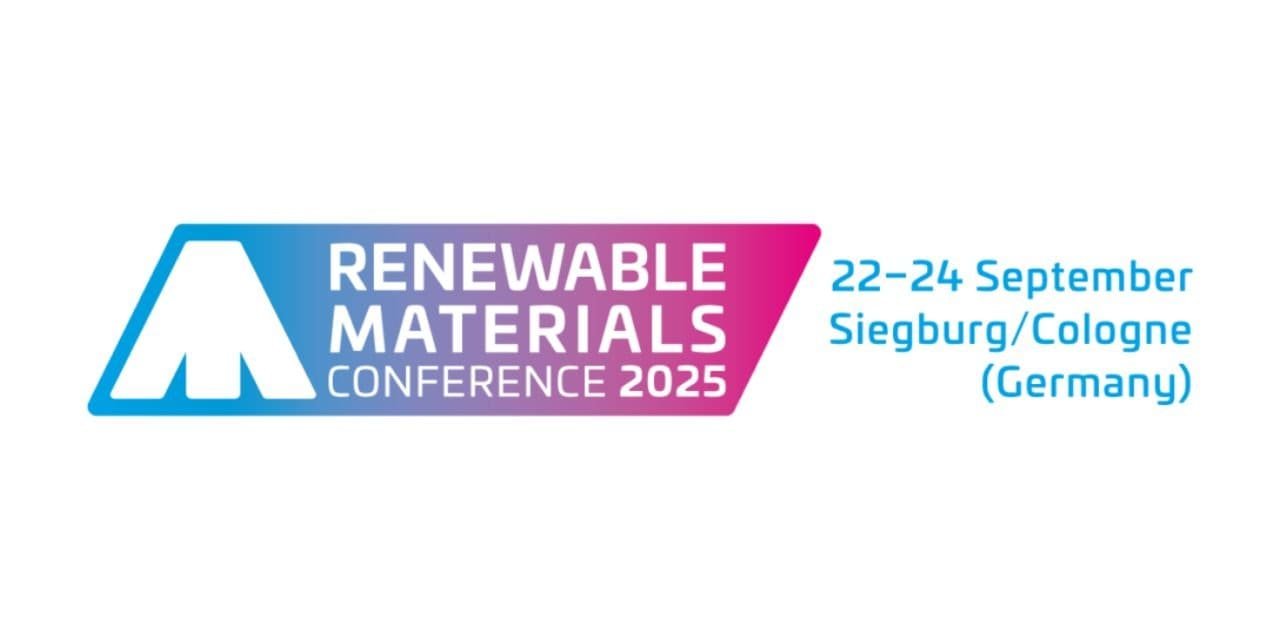The international meeting place for the chemical, the plastics and materials industries will take place from 22 to 24 September 2025 in Siegburg/Cologne. It presents solutions and innovations for replacing fossil carbon with biomass, CO2 utilisation and recycling.
Hürth, January 2025: The world’s largest conference on chemicals and materials based on biomass, carbon capture and utilization (CCU), and advanced recycling—the only substitutes for chemicals and materials derived from fossil fuels—is held at the Renewable Materials Conference (RMC) in Siegburg/Cologne, Germany. Presenting all sustainable material solutions at a single event is a novel idea that works well. It addresses investors and policy makers as well as the full value chain, from alternative carbon feedstocks to the chemical and materials industries, product producers, and brand owners. Ninety percent of the over 500 attendees from 32 nations at the preceding meeting in June 2024 were from industry.
This year, a global audience of professionals will hear 80 presentations, 20 panel discussions, and over ten workshops from leading figures in industry, academia, and politics about the newest fossil fuel-free technologies, innovations, markets, and investments. Since there are only a few booths available, companies, associations, and institutes are encouraged to plan their own workshops and participate in the exhibition. Early registration is advised.
Register here
“The Renewable Materials Conference serves as an important platform for collaboration and knowledge exchange in the renewable materials sector”, says Michael Carus, CEO of nova-Institute, and organiser of the RMC. “Our comprehensive approach covers the entire value chain, from alternative carbon feedstocks, the chemical industry, the materials sector, product manufacturers to brand owners and investors, making RMC the ultimate platform for networking and partnering in the new circular renewable carbon economy.”
Call for contributions
The deadline for submitting abstracts is 16 March and 4 May for the “Renewable Material of the Year 2025” innovation award. Abstracts and innovations should be in line with the five clearly defined topics for this year.
renewable-materials.eu/call-for-abstracts/
renewable-materials.eu/award-application/
Early bird registration until 16 March (20 % discount) and 17 August (10 % discount) renewable-materials.eu/registration/
The first confirmed keynote speakers can be found here: renewable-materials.eu
Five topics of the conference
Defossilisation of the Chemical Industry
The next big thing in mitigating climate change is this topic. Fossil carbon from the earth makes up over 90% of the carbon incorporated in chemicals and polymers; this carbon must be replaced by biogenic, collected, and recycled carbon. For the future of a competitive and sustainable chemicals and plastics business, chemical firms, start-ups, and industry associations are encouraged to share their ideas, tactics, and success stories. Alternative feedstocks, alternative naphtha, the manufacture of electric cracker and non-cracker commodities, biorefineries, and other subjects are covered.
Fine Chemicals
The need for bio-based solutions is rising in the US$180 billion fine chemicals sector worldwide. The need for fine chemicals is unaffected by economic cycles since they are valuable and specialized components of necessities like food additives, cosmetics, personal care items, and medications. The creation of sustainable procedures and high-purity chemicals is being propelled by developments in biotechnology and biocatalysis. In this shift, it is anticipated that the market potential will be unlocked by overcoming obstacles like scalability and cost effectiveness. Companies that produce fine chemicals are encouraged to present their accomplishments and innovative innovations.
Fossil-free Plastics
It would be impossible to imagine modern life without plastics, yet 95% of all plastics made today come from fossil carbon found in the earth; recycling accounts for 4% and biomass for 1% of global plastic production. Demand for plastics made without fossil fuels is rising across a number of product categories. Startups and well-established businesses are encouraged to showcase their breakthroughs in plastics and polymers that are based on recycling, biomass, and captured CO2. Packaging, consumer goods, automobiles, textiles, and high-performance applications are a few examples. The conference provides a special chance to introduce brand owners to fossil plastic substitutes while also taking advantage of networking opportunities and cross-sectoral conversations.
Sustainable Carbon Cycles
The primary goal of the Green Deal is to move away from a linear manufacturing model, which uses enormous amounts of raw resources and produces an equal amount of waste, and toward a circular economy. Since its introduction by the European Commission in 2022, the idea of sustainable carbon cycles has grown in importance for upcoming laws and regulations. At panel discussions and workshops, brands, investors, legislators, and certification organizations are asked to share their ideas and talk about strategies and policies for zero-waste production, circular raw materials, cascading usage, and sustainable carbon cycles.
Biodegradation
The topic of biodegradable polymers is complicated and divisive. The main query now is not whether biodegradable plastics are a desirable option, but rather which applications make sense for biodegradability. The new Packaging and Packaging Waste Regulation (PPWR), which will require biodegradability for first applications, already reflects this. In-depth information on perception, science and policy, relevance and influence, applications, advantages and hazards, and more is requested from scientists, startups, and businesses.
Sponsors
The nova-Institute would like to thank UPM Biochemicals (FI) for supporting the conference as a platinum sponsor, as well as CO₂Value Europe (EU) and TÜV Austria Belgium (BE) as gold sponsors; thanks also to Covestro (DE) for sponsoring the innovation award ‘Renewable Material of the Year 2025’.

